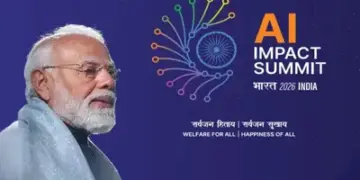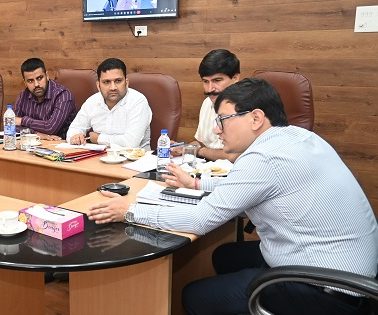By: Arshid Qalmi
Sustainable development has emerged as a crucial concept in today’s world, focusing on meeting the needs of the present without compromising the ability of future generations to meet their own needs. As we face pressing global challenges such as climate change, resource depletion, and environmental degradation, it becomes increasingly vital to educate school-going children about sustainable development. By equipping them with knowledge and values centered on sustainability, we empower them to become responsible global citizens capable of creating a brighter and more sustainable future.
Understanding the Interconnectedness of the World:
Teaching sustainable development to school-going children helps them grasp the intricate web of connections that exist within the global ecosystem. They learn that environmental, social, and economic factors are deeply interdependent and that the actions we take today can have far-reaching consequences. By understanding these connections, children can develop a holistic perspective and make informed decisions to minimize negative impacts on the environment.
Environmental Stewardship:
Children are inheritors of the planet, and it is crucial to instill in them a sense of responsibility for its preservation. Education about sustainable development introduces them to the importance of conserving natural resources, protecting biodiversity, and mitigating climate change. By fostering an environmental stewardship mindset, children can actively contribute to sustainable practices such as recycling, energy conservation, and sustainable consumption patterns.
Empowering Critical Thinking and Problem-Solving Skills:
Sustainable development education encourages children to think critically and analyze complex issues from multiple perspectives. They learn to evaluate the environmental, social, and economic implications of their choices. By engaging in problem-solving activities related to sustainable development, children develop creativity, adaptability, and resilience—the essential skills required to address the challenges of the 21st century.
Social Responsibility and Global Citizenship:
Sustainable development is not solely about environmental conservation; it also encompasses social equity and economic well-being. By teaching children about social responsibility, empathy, and inclusivity, they become aware of the importance of fairness and justice in building sustainable societies. They understand that sustainable development is a global endeavor, emphasizing the need for collaboration, cooperation, and respect for diverse cultures and perspectives.
Preparing for Future Careers:
As the world transitions towards a sustainable future, there is a growing demand for professionals with expertise in sustainable development. By introducing children to the principles of sustainability at an early age, we equip them with the knowledge and skills necessary for the emerging green economy. They can pursue careers in fields such as renewable energy, sustainable agriculture, environmental management, and urban planning, making a positive impact on the world while ensuring their own future employability.
Encouraging Sustainable Lifestyles:
Educating school-going children about sustainable development also involves promoting sustainable lifestyles. By teaching them about the ecological footprint and the impact of individual choices, children become aware of their consumption patterns and the resources required to sustain them. They learn about alternatives such as sustainable transportation, organic food, and responsible waste management. Encouraging sustainable lifestyles from an early age sets the foundation for a generation that prioritizes conscious and sustainable choices, leading to reduced environmental degradation and improved overall well-being.
Building Resilience and Adaptation:
Sustainable development education equips children with the knowledge and skills needed to adapt to a rapidly changing world. They learn about the impacts of climate change, natural disasters, and other environmental challenges. By understanding these risks, children can develop resilience and adaptability, finding innovative solutions to mitigate and cope with such challenges. They become more prepared to face the uncertainties of the future and contribute to building more resilient communities.
Fostering a Sense of Hope and Empowerment:
In a world grappling with environmental and social issues, teaching sustainable development to children provides them with a sense of hope and empowerment. They realize that they can make a difference, no matter how small, through their everyday actions and choices. This empowerment instills a sense of agency and responsibility, motivating children to actively participate in initiatives and campaigns that promote sustainable development, whether it be at school, in their communities, or on a larger scale.
Connecting Classroom Learning to Real-World Issues:
Sustainable development education goes beyond textbooks and classrooms. It encourages experiential learning and engagement with real-world issues. Field trips, outdoor activities, and community projects allow children to witness and understand the practical implications of sustainable development principles. By connecting theoretical knowledge to tangible experiences, children develop a deeper appreciation for the environment and an understanding of the need for sustainable practices.
Securing a Sustainable Future:
Ultimately, teaching sustainable development to school-going children is an investment in securing a sustainable future for generations to come. By empowering children with knowledge, values, and skills aligned with sustainability, we cultivate a generation capable of addressing the complex challenges of our time. These children will grow up to become policymakers, scientists, entrepreneurs, and community leaders, shaping a world where environmental, social, and economic well-being go hand in hand.
Teaching school-going children about sustainable development is an imperative for creating a sustainable future. By encouraging sustainable lifestyles, fostering resilience and adaptability, instilling hope and empowerment, and connecting classroom learning to real-world issues, we equip children with the tools to become active participants in building a better world. As educators, parents, and society as a whole, it is our responsibility to ensure that children receive a comprehensive education that integrates sustainable development principles, enabling them to contribute to a future that is environmentally sound, socially just, and economically prosperous. aqalmi303@gmail.com







